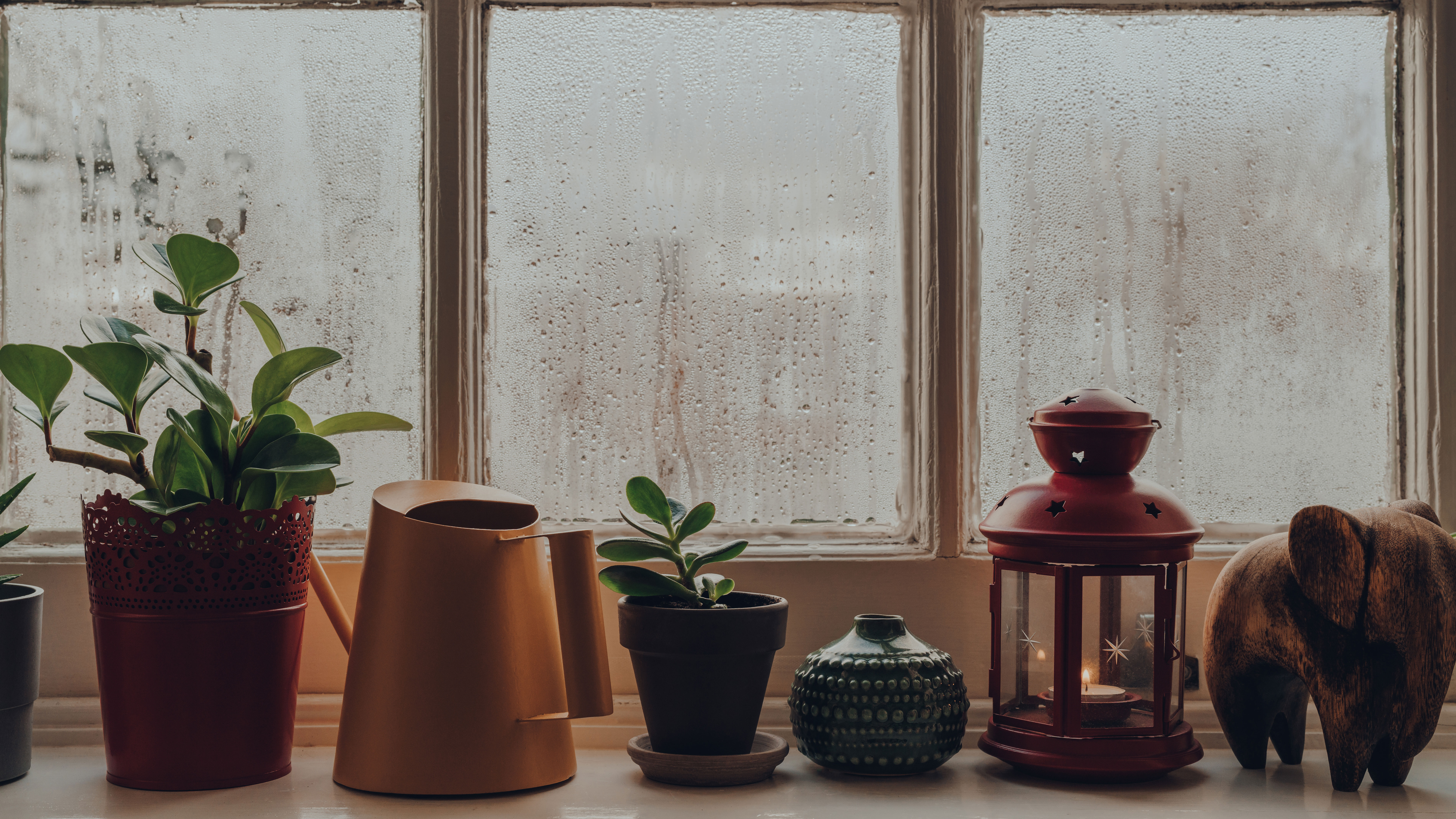How to stop condensation on windows - the expert guide that changes everything
Knowing how to stop condensation on windows means a warmer, healthier and more efficient home. Here's how to get it right


How to stop condensation on windows is something we ourselves are frantically googling right now. It's a really common issue that can happen to any style or age of properties – it's not just a nice bonus to owning a period property with beautiful but not exactly ideal single glazed windows, it can be a problem in modern homes with double glazing too.
While condensation is more common in the colder months as the temperatures outside plummet, it can occur at any time of year. 'Condensation in the winter is both common and annoying. It occurs when the moist air inside your home comes into contact with a surface whose temperature is lower than the air. But getting rid of condensation is easier than you’d think.' says Shaf Member of QS Supplies.
'Condensation is bad for windows because it causes the formation of mold and limescale on your windows, makes paint or varnish peel, and damages wooden parts. To stop condensation, you need to reduce the amount of moisture within your home.'
But what are the easiest ways to reduce moisture in your home and prevent foggy windows and glazing? We've asked the experts for their top tips to help reduce condensation in your home.
How to stop condensation on windows – 7 expert tips to try
1. Ventilate your rooms
This is one of the easiest ways you can reduce condensation on windows, and something you can bring into force right now – keep your home ventilated. Opening windows when it's chilly outside may not sound all that appealing but it will make a real difference in reducing that moisture.
'Making sure your home has great ventilation by opening the windows for even just 20 minutes a day can drastically reduce the effects of condensation and dampness in homes. Also keeping windows open during activities that cause a lot of moisture in the home such as cooking, showering, and drying clothes, especially if you don’t have great ventilation, can help minimize condensation.' explains James Mokler from Kärcher.
You might want to just crack a window every so slightly when you are sleeping, or at least as soon as you get up in the morning, as this is likely to be when the condensation will be at its worst. Keeping windows and blinds open whenever possible too will help clear condensation faster.
The Livingetc newsletters are your inside source for what’s shaping interiors now - and what’s next. Discover trend forecasts, smart style ideas, and curated shopping inspiration that brings design to life. Subscribe today and stay ahead of the curve.
2. Ensure to keep the temperature constant
To reduce condensation your heating system and the temperature of your home is best kept regular. So rather than just blasting the heat when you want your house to feel warmer, maintain a constant and ambient temperature by keeping your heating on low and constant throughout the colder months.
'Ensuring that there’s a regular warm temperature around your home will stop surfaces from getting cold enough for condensation to build.' continues James. 'The heating doesn’t need to be on constantly throughout the day, but a timer can be used to switch on the heating during the coldest periods, keeping surfaces warm and preventing condensation from forming.'
3. Prevent steam from flowing around your home
Condensation forms when water vapors in the air come in contact with cold surfaces, and in the winter you'll probably find your windows to be a very cold surface. So one way to stop condensation on windows is to prevent lots of water vapor from floating around your home and reduce the moisture in the air.
'Condensation in your kitchen is unavoidable, with the average household generating up to 3 liters of moisture daily from cooking activities.' says Shaf Member. 'Simple behavioral measures such as covering pots with lids, opening a ventilator/ window, and using an extractor fan or cooker hood can help prevent the dreaded buildup of condensation on your kitchen windows.'
'In bathrooms, get into the habit of opening the window after every bath and shower to allow the warm, moist air to escape. If condensation has appeared on windows, simply give them a wipe down to take away the additional moisture.’ adds Jenny Turner, Property Manager at Insulation Express.
And close doors too when you are cooking or showering so the steam is kept to just one room of the house.
4. Invest in better insulation for your home
This is a bigger commitment and expense, however, if condensation still remains to be a problem after trying out more immediate ways of reducing or stopping it, improving the insulation in your home could be the best method. And there are other benefits to re-insulating your house too like it could help you save energy and reduce your bills.
You might also want to consider upgrading your windows to double glazing to improve your home's insulation – again a costly solution but a guaranteed way to stop condensation, plus it could add value to your home.
5. Add a layer of anti-condensation paint
Anti-condensation paint is essentially a thicker than average paint that's designed to allow walls to absorb any moisture in the room, preventing mold, mildew, and condensation on windows. It's mostly designed for high-moisture rooms like kitchens and bathrooms but can work in other rooms too if you are finding condensation to be a problem elsewhere.
As you can imagine the color palette isn't the most... inspiring, you'll mostly find an array of neutrals. But you can actually use anti-condensation paint as a base and paint over it in a color of your choice.
6. Avoid drying clothes indoors
This can be tricky in winter months but one of the biggest causes of condensation on windows is the water vapor that comes off drying clothes, whether that be on a clothes horse or a radiator.
'A major culprit of condensation inside your home is the drying of clothes on radiators.' says Shaf. 'Few people are aware that drying a typical 4kg load of washing can release up to 2 liters of water into your home.'
'Not only does this cause condensation on your windows, but it also promotes dampness, leading to a mold infestation and exacerbated allergies. If you cannot help drying your clothes indoors, make sure the room is well ventilated. Further, investing in a dehumidifier will be a lifesaver - they are inexpensive and don’t require any maintenance apart from being emptied from time to time.'
7. Try a window vac
A window vac is a great short-term solution for condensation and helps prevent any of the issues that come with it like mold, mildew, and water damage to your frames.
'While we know that the act of cleaning can help prevent germs, the benefits of Window Vacs go well beyond cleaning windows and shower screens. A Window Vac is a winter essential as it helps with condensation and the prevention of damp in the home which can make us vulnerable to illness during the colder months.' explains James Mokler.
They work by quickly removing any moisture from your windows, as is far more efficient and effective than wiping away the condensation with a cloth or towel.
How do you stop condensation on windows overnight?
Condensation mostly appears on windows overnight as that is when the temperature indoors and out are at their most extreme. It's also when you spend the longest in one room and the accessive moisture from your breath will condense on the cold surface of the windows.
A way to prevent condensation overnight is to keep the room well ventilated, which may mean opening a window ever so slightly. If this isn't an option then you should open the windows as soon as you get up in the morning and wipe any condensation from them.
Is sleeping in a room with condensation bad for you?
Condensation itself isn't particularly harmful but the damage it can do is. Condensation can lead to mold and 'if there is damp and mold in a home, the occupants are more likely to have respiratory problems such as asthma and allergies leaving babies, children, and the elderly most at risk.' explains James Mokler.
Adam Pawson of Safestyle Windows adds, 'If molds, which contain allergens and toxic substances, begin to form in your home it has been proven to cause serious problems for people with existing health conditions such as eczema, asthma, and those with a weakened immune system.'

Formerly the Digital Editor of Livingetc, Hebe is currently the Head of Interiors at sister site Homes & Gardens; she has a background in lifestyle and interior journalism and a passion for renovating small spaces. You'll usually find her attempting DIY, whether it's spray painting her whole kitchen, don't try that at home, or ever-changing the wallpaper in her entryway. She loves being able to help others make decisions when decorating their own homes. A couple of years ago she moved from renting to owning her first teeny tiny Edwardian flat in London with her whippet Willow (who yes she chose to match her interiors...) and is already on the lookout for her next project.